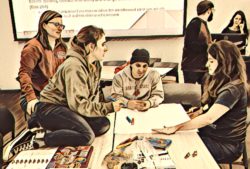
Assignments
Assignments
- Projects (Unit Plan & Reflection): ~30% of grade
- Presentations & Collaboration (YA Novels and Writing Assignment): ~30% of grade
- Doing Things Together (Reading, Writing, Annotating): ~40% of grade
One of the practices I would like us to consider this semester is annotation in its various forms: digital, marginal, multimodal. We’ll annotate shared texts in our Book in a Box project, via readings in Perusall, and on drafts written by each other and an AI (ChatGPT). We’ll read about annotation practices we can apply with students (Brown) and in the world (Kalir & Garcia). We’ll try out platforms for annotating as well, such as Perusall and Hypothes.is. ,perhaps even trying out one of the suggested assignments.
Reading & Discussions (10@10 points/100 points)
various due dates
![]() We’ll read and annotate some of our shared texts together in a platform called Perusall. My goal with the reading and these discussions is to support your Unit Project throughout the semester. Many of the readings are examples of lesson plans. We’ll get set up in our first class session.
We’ll read and annotate some of our shared texts together in a platform called Perusall. My goal with the reading and these discussions is to support your Unit Project throughout the semester. Many of the readings are examples of lesson plans. We’ll get set up in our first class session.
Book in a Box Annotations (15 points x 2/30 points)
various due dates
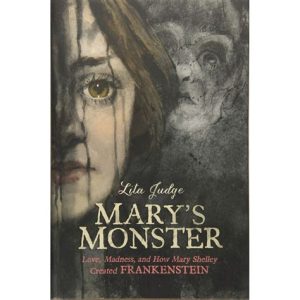
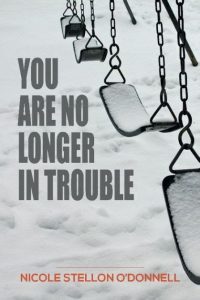 On various weeks, 2-3 people will take a physical box home: in the box will be a book and numerous supplies for making and annotating, plus snacks. Our first book in the box will be Mary’s Monsters by Lita Judge. Later in the semester, we’ll read passages from You Are No Longer in Trouble by Nicole Stellon O’Donnell and play with adding to her vignettes.
On various weeks, 2-3 people will take a physical box home: in the box will be a book and numerous supplies for making and annotating, plus snacks. Our first book in the box will be Mary’s Monsters by Lita Judge. Later in the semester, we’ll read passages from You Are No Longer in Trouble by Nicole Stellon O’Donnell and play with adding to her vignettes.
You will annotate the books and leave us some sort of artifact for the next set of readers: you could imagine a lesson plan that might stem from the book, write a review, create a visual representation or drawing of some kind, write a poem or short prose inspired by the book, share a link (on a post-it) to a YouTube video with a vlog about the book, or even create a kind of pop-up book inside. Ultimately, I would think of these artifacts as a “gift” that you leave for the next set of readers: the artifacts are a reification of the ideas. Ideally, working with a book in this way can also build excitement for reading.
Check out my Dear Reader letter and more inspiration here
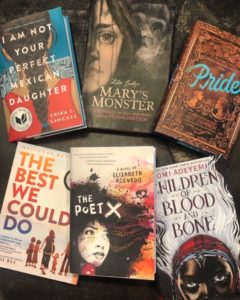 Designing Lesson Plans: YA novel teams (40 points)
Designing Lesson Plans: YA novel teams (40 points)
various due dates
YA Novels: Lesson Plan
You’ll read a newer, young adult novel with a small group, meet to talk about the book, and consider how you might use the book with middle or high school students. I’m inviting you to think about your group as your English Department team of teachers. Your teacher team will design lesson plans, using the YA book as an anchor texts. Kim has copies of these books, so nothing to buy.
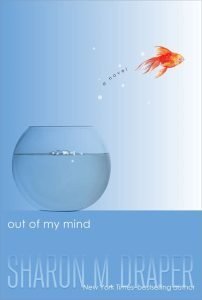
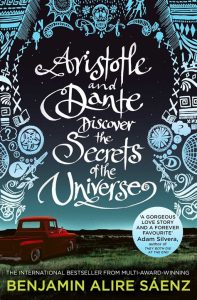
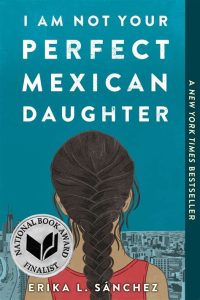
Groups choose a book from this list:
- Out of My Mind by Sharon Draper
- Aristotle & Dante Discover the Secrets of the Universe by Benjamin Alire Sáenz
- I Am Not Your Perfect Mexican Daughter by Erika L. Sánchez
Components:
- The team will create an 45-minute lesson plan. We’ll negotiate the components and template for sharing our plans (I’m thinking shared slide deck, but open to ideas).
- Your team will lead our class in the lesson plan (25 points)
- Other teams will give feedback on the plan from student perspective (15 points)
Writing Assignment Design (60 points)
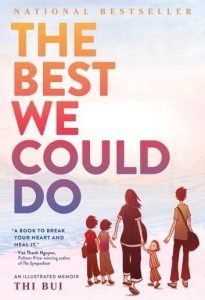 Using The Best We Could Do, each person will create an series of informal or a formal writing assignment (60 points: assignment design (20), trying out the assignment (20), giving feedback (20))
Using The Best We Could Do, each person will create an series of informal or a formal writing assignment (60 points: assignment design (20), trying out the assignment (20), giving feedback (20))
-
-
- Purpose: why are students working with this assignment? What will it help them know or do? How does it connect to other assignments or ideas?
- Preparation: what will students need to do to complete the assignment? How will class time support the writing? What writing practices will students need to know/learn to do to complete the assignment? For example, do they need to work with quotes to support claims? How will you model that practice?
- Genre: what are the components of the writing assignment?
- Evaluation: how will the components be assessed? Will students also have input into this? For example, I sometimes create rubrics with our class after we’ve completed a first draft and have a sense of the possible ways of approaching the assignment.
- You will swap these writing assignments with a partner from your team, try writing the assignment, and give feedback. *It might be interesting to ask ChatGPT to write the first draft and then have the partner annotate/revise the draft for feedback. We can talk about this option as a class.
-
Designing Unit Plans (75 points)
various due dates
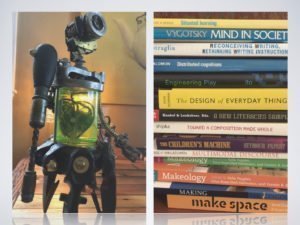 The major work for our course will be a month-long unit that incorporates elements focused on reading, writing, and language study.
The major work for our course will be a month-long unit that incorporates elements focused on reading, writing, and language study.
Components:
-
- Overall Rationale: What are your goals for the unit? What do you want students to learn? Why do you think these goals are important for students in an English class and beyond? How does your unit fit with the goals specified in the California Standards for English Language Arts? (most likely, you’ll write the rationale last, after you’ve figured out the other portions below)
- Reading choices and rationale: What kinds of reading do you want students to be able to do? What texts will you use? What is your rationale for choosing these texts? Are you including a variety of genres and forms? The reading selections should be focused on one “anchor text” (a canonical or young adult literary selection or poetry, for example) and at least one associated non-fiction, non-literary text, and should identify a set of skills and/or approaches related to helping students “read” those texts.
- Writing assignments and rationale: Create an assignment sequence: perhaps a major assignment and smaller assignments to support it. Or a series of smaller assignments. What kinds of writing will students do? Will there be both informal and formal writing? What genres will students compose in? Why have you chosen those genres?
- Language rationale: What aspects of language will you teach? Why are those aspects important for students to learn? How do the reading and writing choices in your unit support students’ learning of language?
- Detailed Week’s Plan: What will a week look like? You’ll create three days of lesson plans in detail and shorter descriptions of plans for the other days/weeks.
- Assessments: What will you do to determine if your goals have been met? What will students do/say/write that will show you whether they have reached your objectives?
- Reflection: What have you learned from creating this lesson unit? What excites you about the unit? What questions or concerns about it remain?
- Overall Rationale: What are your goals for the unit? What do you want students to learn? Why do you think these goals are important for students in an English class and beyond? How does your unit fit with the goals specified in the California Standards for English Language Arts? (most likely, you’ll write the rationale last, after you’ve figured out the other portions below)
Unit Plan Support document (with examples)
Reflection: What I Learned as an English major (25 points)

I want to design this assignment together. Our goal: gather and curate the work you’ve done in the major and reflect on what you’ve learned and what you’ve learned to do.
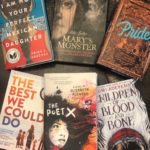

 Office:
Office: